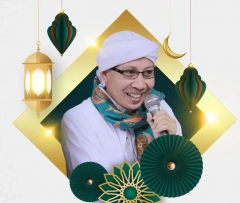 Adinda hanny aqillah rifdah
Adinda hanny aqillah rifdah
Akhlakul Karimah as a Guide for Students in Organizations, Nation and State
Agama | Monday, 01 Jan 2024, 18:07 WIB
As social creatures, we will definitely gather and form a group that has an identity which is called an organization, nation, and state. By forming a group, individuals will feel protected, then being in a group will create an environment for interaction and communication, and being in a group can help in mobilizing tasks and roles within the group.
In carrying out an institution that has certain functions and roles in society, it must be regulated by policy and law. Likewise, with the Islamic religion, there is the Al-Qur’an as our guide. In the Al-Qur’an, it is mentioned and explained how we can organize, act, and behave in organizations, nations, and states. This can be reflected through morals where morals include honest behavior, compassion, responsibility, patience, fairness, and helping others.
Morals are behavior and attitudes that only exist if we work on them. It's because we do it. Without effort, morals will not be formed. As Muslims, we are educated and taught good morals. By having noble morals, we will be liked by many people. Just think about what would happen if we didn't have noble morals. Surely we will sin and be far from heaven. Especially when organizing, as a nation and as a state. As an example of the form of a state that we can feel or see now, we will be faced with elections that will be held in February if there are people or individuals who commit fraud, such as manipulating election results. This would be contrary to good morals. Apart from states, there are also nations. For example, in Indonesia there are many diverse tribes, cultures, religions, and languages. As Muslims, we must be able to respect existing differences without favoritism in establishing social relationships. Furthermore, in organizations, in organizations we will be given the trust to carry out our duties, therefore we should carry them out with full responsibility.
Islam teaches us to have noble morals because by nature we must have good morals in order to be accepted in society. With good morals we will be liked by many people. Just think about social life, people who don't have good morals often get into trouble, criticism and ridicule from the people around them. How good it would be as a civilized human being to have noble morals. Because Allah SWT really loves his people who have noble morals.
As students who are always in a campus environment, we can develop our morals by focusing on smaller environments such as joining organizations on campus and outside campus. especially nowadays, it requires us to be able to interact in the social environment, both in society and in organizations. There are many programs offered by the government and private parties that can be found, such as on Instagram, TikTok, and many more. By participating in this program, students can be more critical in dealing with environmental issues and are expected to be able to solve problems more innovatively.
Like volunteer programs, usually we will carry out volunteer activities without being paid. By being placed in remote areas or underdeveloped areas that require assistance, sometimes in the form of education for the community, or perhaps usually in the form of physical assistance. Before we participate, there are a series of administration or perhaps selection stages. After successfully passing the administration and selection stages, the next stage is the training stage in the form of guidance before the activity.
This makes us Muslim students with good morals who are responsible, caring, honest, affectionate, patient, fair, and helpful towards others. In the future, it is hoped that students can become the nation's successors with noble morals and can make this nation better.
In the Al-Qur’an, it is explained about morals in organizations, nations and states. There are several surahs that explain procedures and advice that will later form a civilized Muslim or akhlakul karimah. By always following the noble morals of the prophets. Here are some surahs that discuss morals:
Surah Al-Hujurat (49): Verse 13:
"O mankind, indeed We created you from a man and a woman and We made you into various nations and tribes so that you may know each other. Indeed, the noblest among you in the sight of Allah is the most pious among you "Indeed, Allah is All-Knowing, All-Knowing."
Surah Al-Hujurat (49): Verse 11:
"O you who believe, do not let men degrade other men; it may be that those (who are degraded) are better than those (who degrade). And do not let women degrade other women; it may be that they (those who are humiliated) are better than those (who humiliate). Do not criticize yourselves and do not call each other names that contain ridicule. The worst thing is to call (the name of) wickedness after faith, and whoever does not repent , then they are the wrongdoers."
Surah Al-Hujurat (49): Verse 10:
"And if news comes to you from the wicked, then examine it carefully (before you accuse or punish others), so that you do not bring misfortune to a people without knowledge, then you become sorry for your actions.
Surah Al-Baqarah (2): Verse 197:
"And complete the Hajj and Umrah for the sake of Allah. If you are prevented, then (in exchange for) an easy sacrifice (slaughter of the sacrificial animal). And do not shave your heads before the sacrificial animal until the sacrifice reaches the place of slaughter. Whoever of you is sick or If anyone experiences difficulty with his hair (so he has to shave his hair), then he must pay the fidyah by fasting or giving alms or making a sacrifice. So if you are saved (from hardship) let after the Hajj you (pay) an easy sacrifice. Whoever does not obtain ( sacrificial animal), then let him fast three days during the Hajj and seven days when he returns. These are ten perfect days. The same is for those who are not in the Grand Mosque. And fear Allah and know that indeed Allah His torment was very severe."
Surah Al-Ma'un (107): Verses 1-7:
"Do you know (those who deny the Day of Judgment)? It is he who denies religion, who looks down on orphans and does not encourage giving food to the poor. So woe to those who pray, (especially) those who neglect their prayers, who does riya, and forbids giving food (to the poor)."
Adinda Hanny Aqillah Rifdah_CLASS K_AIK 1_ Universitas Muhammadiyah Yogyaka
Disclaimer
Retizen adalah Blog Republika Netizen untuk menyampaikan gagasan, informasi, dan pemikiran terkait berbagai hal. Semua pengisi Blog Retizen atau Retizener bertanggung jawab penuh atas isi, foto, gambar, video, dan grafik yang dibuat dan dipublished di Blog Retizen. Retizener dalam menulis konten harus memenuhi kaidah dan hukum yang berlaku (UU Pers, UU ITE, dan KUHP). Konten yang ditulis juga harus memenuhi prinsip Jurnalistik meliputi faktual, valid, verifikasi, cek dan ricek serta kredibel.








